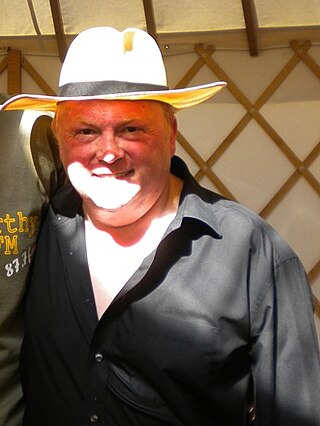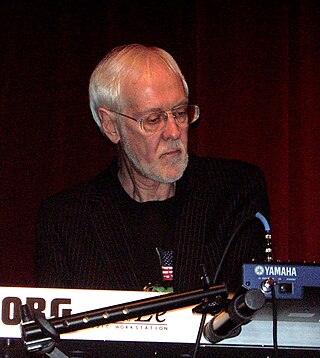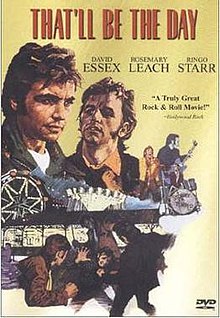
David Essex is an English singer-songwriter and actor. From 1973 to 1994, he had 19 Top 40 singles in the UK and 16 Top 40 albums. Internationally, Essex had the most success with his 1973 single "Rock On". He has also had an extensive career as an actor.

David Terence Puttnam, Baron Puttnam, CBE, HonFRSA, HonFRPS, MRIA is a British-Irish film producer, educator, environmentalist and former member of the House of Lords. His productions include Chariots of Fire, which won the Academy Award for Best Picture, The Mission, The Killing Fields, Local Hero, Midnight Express and Memphis Belle. In 1982, he received the BAFTA for Outstanding British Contribution to Cinema, and in 2006 he was awarded the BAFTA Fellowship for lifetime achievement from the British Academy of Film and Television Arts.

Frankie Laine was an American singer and songwriter whose career spanned nearly 75 years, from his first concerts in 1930 with a marathon dance company to his final performance of "That's My Desire" in 2005. Often billed as "America's Number One Song Stylist", his other nicknames include "Mr. Rhythm", "Old Leather Lungs", and "Mr. Steel Tonsils". His hits included "That's My Desire", "That Lucky Old Sun", "Mule Train", "Jezebel", "High Noon", "I Believe", "Hey Joe!", "The Kid's Last Fight", "Cool Water", "Rawhide", and "You Gave Me a Mountain".

Bernard William Jewry, known professionally as Shane Fenton and later as Alvin Stardust, was an English rock singer and stage actor. Performing first as Shane Fenton in the 1960s, Jewry had a moderately successful career in the pre-Beatles era, hitting the UK top 40 with four singles in 1961–62. However, he became better known for singles released in the 1970s and 1980s as Alvin Stardust, a character he began in the glam rock era, with hits including the UK Singles Chart-topper "Jealous Mind", as well as later hits such as "Pretend" and "I Feel Like Buddy Holly".
The Tornados were an English instrumental rock group of the 1960s that acted as backing group for many of record producer Joe Meek's productions and also for singer Billy Fury. They enjoyed several chart hits in their own right, including the UK and US no. 1 "Telstar", the first US no. 1 single by a British group.

Ronald Wycherley, better known by his stage name Billy Fury, was an English musician. An early star of rock and roll, he equalled the Beatles' record of 24 hits in the 1960s and spent 332 weeks on the UK chart. His hit singles include "Wondrous Place", "Halfway to Paradise" and "Jealousy". Fury also maintained a film career, notably playing rock performers in Play It Cool in 1962 and That'll Be the Day in 1973.

Michael Philip Batt, LVO is an English singer-songwriter, musician, arranger, record producer, director and conductor. He was formerly the Deputy Chairman of the British Phonographic Industry.

Marty Wilde, is a British singer and actor. He was among the first generation of British pop stars to emulate American rock and roll, scoring several 1950s and 1960s hit singles including "Endless Sleep", "Sea of Love" and "Bad Boy". During the late 1960s to early 1980s, Wilde continued to record and, with Ronnie Scott, co-wrote hit singles for others including the Casuals' "Jesamine" and Status Quo's "Ice in the Sun". He is the father of pop singer Kim Wilde and co-wrote many of her hit singles including "Kids in America" with his son Ricky. He continues to perform and record.

Ziggy Stardust: The Motion Picture is a live album by the English musician David Bowie, released in October 1983 in conjunction with the film of the same name. The music was recorded during the Ziggy Stardust Tour at the Hammersmith Odeon in London on 3 July 1973, although the album was not issued by RCA Records until 1983. Prior to that it had existed in bootleg form, notably His Masters Voice – Bowie and the Spiders From Mars' Last Stand.

Sally Can't Dance is the fourth solo studio album by American rock musician Lou Reed, released in September 1974 by RCA Records. Steve Katz and Reed produced the album. It remains Reed's highest-charting album in the United States, having peaked at #10 during a 14-week stay on the Billboard 200 album chart in October 1974. It is also the first solo Lou Reed album not to feature any songs originally recorded by Reed's earlier band, the Velvet Underground, as well as the first of Reed's solo studio albums to be recorded in the United States. The album art was designed by noted Fillmore and Broadway poster artist David Edward Byrd and was one of the few album covers he ever designed.

Local Hero is the debut soundtrack album by British singer-songwriter and guitarist Mark Knopfler, released in April 1983 by Vertigo Records internationally and by Warner Bros. Records in the United States. It contains music composed for the 1983 film Local Hero, produced by David Puttnam and both written and directed by Bill Forsyth.

John Christopher Hawken is an English keyboard player, best known as a member of The Nashville Teens, Renaissance, and the Strawbs. He also played in Spooky Tooth, Third World War, Vinegar Joe and Illusion, as well as being a session musician.

Stardust is a 1974 British musical drama film directed by Michael Apted and starring David Essex, Adam Faith, and Larry Hagman. It is the sequel to the 1973 film That'll Be the Day, which introduced the characters of Jim MacLaine and his street-smart friend Mike Menary. It chronicles Jim's rise and fall as an international rock star during the 1960s and early 1970s, with Mike as his personal manager. It features a number of pop/rock performers, including Essex, Faith, Keith Moon, Marty Wilde, Dave Edmunds, Paul Nicholas and Edd Byrnes.

"Rock On" is a song written by English singer David Essex. Recorded in 1973 and released as a single by Essex, it became an international hit. In 1989, American actor and singer Michael Damian recorded a cover version that went to number one on the Billboard Hot 100 chart. The song has been recorded many times, including a 2006 version by the English hard rock group Def Leppard.
Ray Connolly is a British writer. He is best known for his journalism and for writing the screenplays for the films That'll Be the Day and its sequel Stardust, for which he won a Writers' Guild of Great Britain Best Screenplay award.

"Long Live Rock" is a 1979 single by The Who, written by Pete Townshend and recorded in 1972. A different version of the song was performed by Billy Fury's character in the film That'll Be the Day.

David Essex is the second studio album by British singer David Essex. It was released at the end of September 1974 and was produced, arranged and conducted by Jeff Wayne. It peaked at number two on the UK Albums Chart and was the Christmas number two album that year.

The Concert for Bangladesh is a film directed by Saul Swimmer and released in 1972. The film documents the two benefit concerts that were organised by George Harrison and Ravi Shankar to raise funds for refugees of the Bangladesh Liberation War, and were held on Sunday, 1 August 1971 at Madison Square Garden in New York City. As well as notable performances from Harrison and Shankar, the film includes "main performer" contributions from Harrison's fellow ex-Beatle Ringo Starr, Billy Preston and Leon Russell, and a surprise walk-on from Bob Dylan. Other contributing musicians include Ali Akbar Khan, Eric Clapton, the band Badfinger, Klaus Voormann, Jesse Ed Davis, Jim Horn and Jim Keltner.
"A Thousand Stars" is a song written by Eugene Pearson and performed by Kathy Young and the Innocents.
Wishful Thinking are a British rock band, originally formed in the 1960s.
















